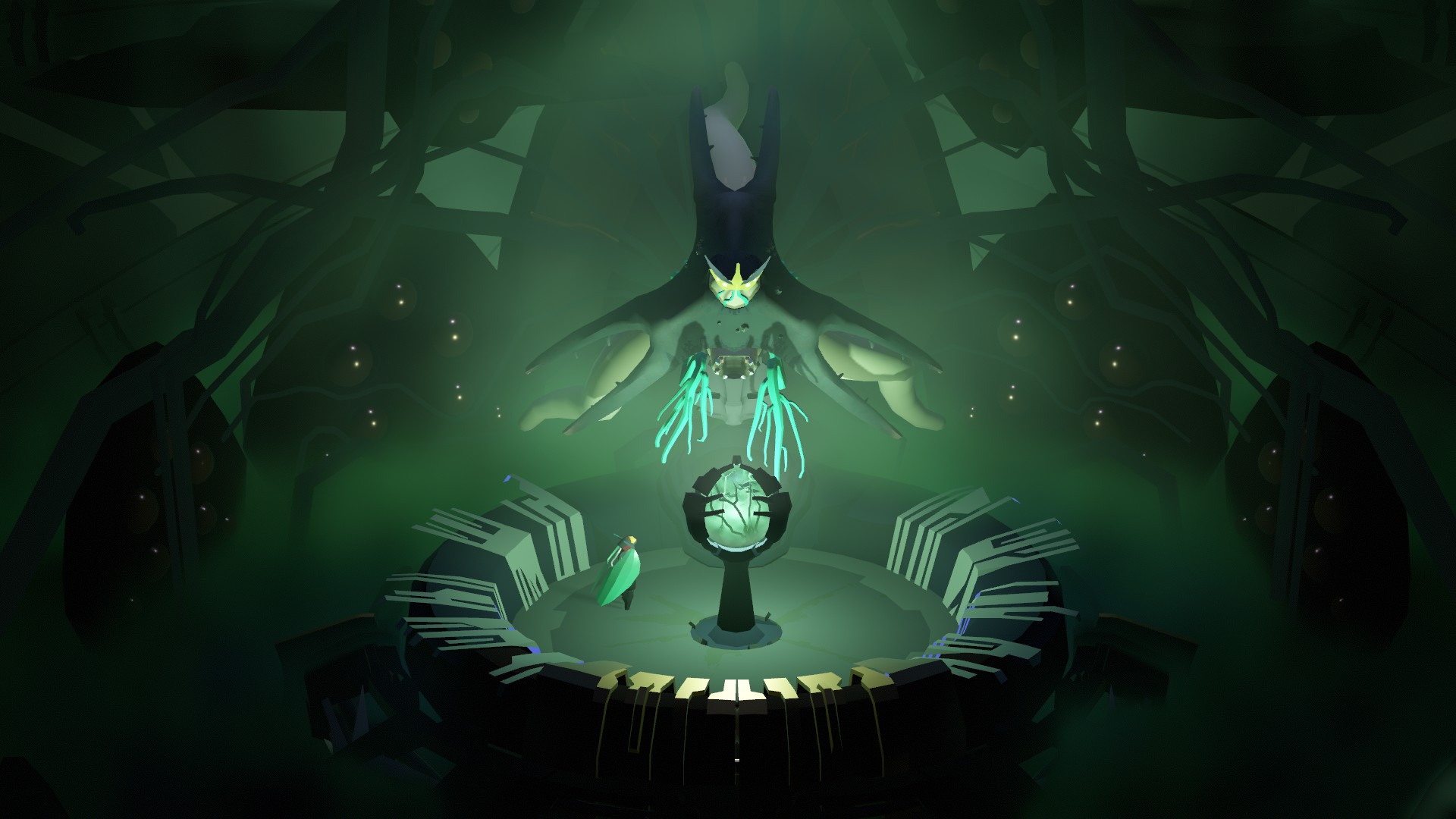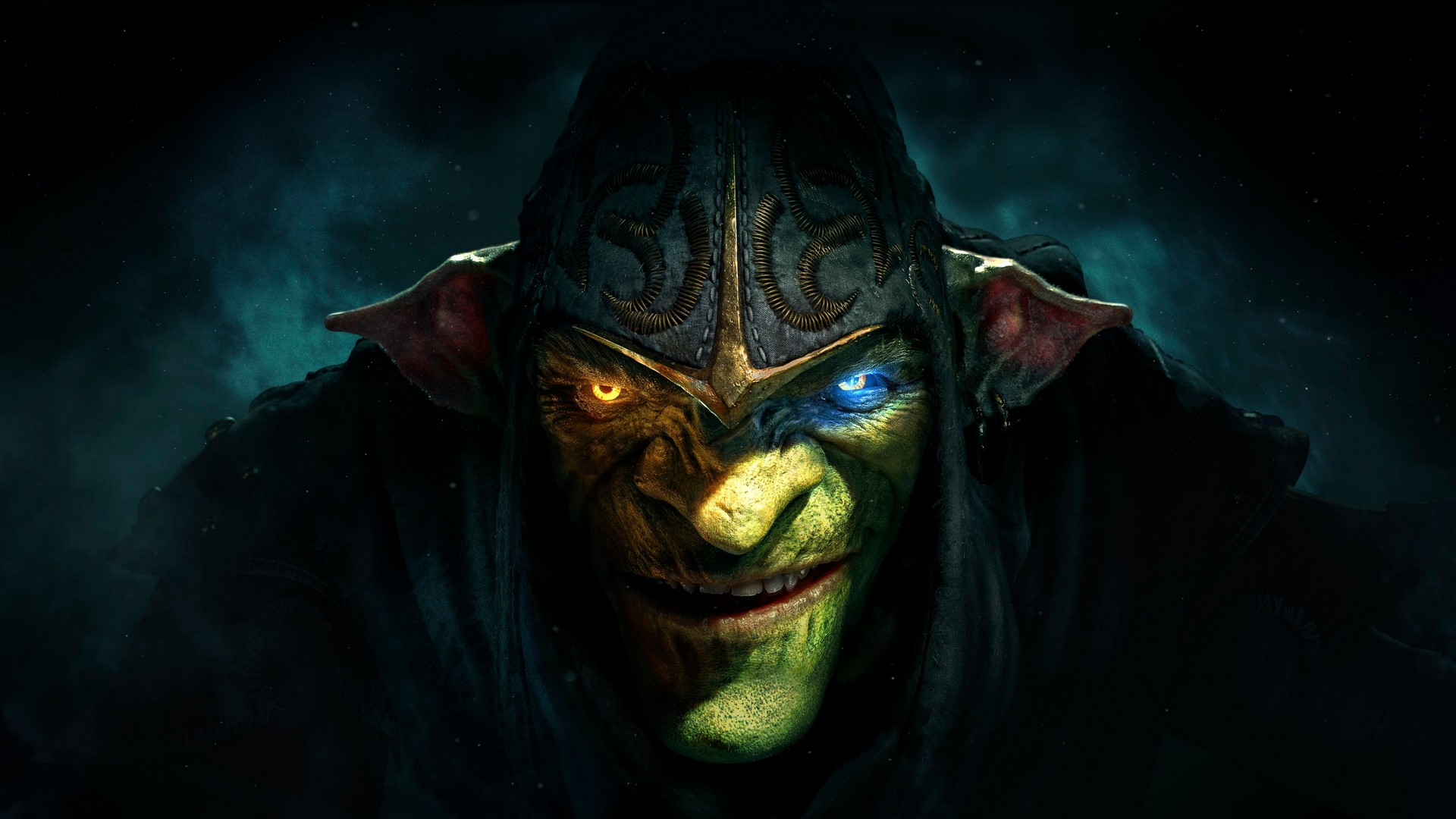GamesRadar+ Verdict
Cocoon's world-hopping puzzle design is smart, compelling, and effortlessly seamless. Together with a strange biomechanical world of rich environments and soundscapes, Geometric Interactive's mind-bending adventure may very well be the best puzzle game of 2023.
Pros
- +
Seamless puzzle design with a compelling and satisfying world-hopping core
- +
Dense atmosphere featuring rich environments and soundscapes
- +
A wonderfully strange biomechanical world that constantly surprises
Cons
- -
Potential to beat boss encounters on the first try, minimizing their presence
Why you can trust GamesRadar+
No other game has lulled me into a zen-like flow as quickly as Cocoon. It's a world-hopping puzzle adventure with ideas, rules, and mechanics so slickly implemented it's spellbinding. Developer Geometric Interactive's biomechanical alien world may be wordless, but it's home to puzzle design with immense depth, nestled in environments and soundscapes teeming with life. We've already seen some great puzzle adventure games released this year (Planet of Lana and Viewfinder come to mind), but this is something special. Cocoon is a mind-bending game that will connect with your neurons so seamlessly that you'll feel like you've been brain-slugged.
Cocoon's world is a strange, wonderful fusion of organic matter and metal, where the fleshiness and squishiness of plants have merged with cold, industrial machinery (it's very H.R. Giger meets A Bug's Life). Playing as a small bug-like creature, you need to navigate through this odd place using the art of world-hopping. Each world exists inside an orb, and our bug friend can jump in and out of these orbs as well as carry them on their back.
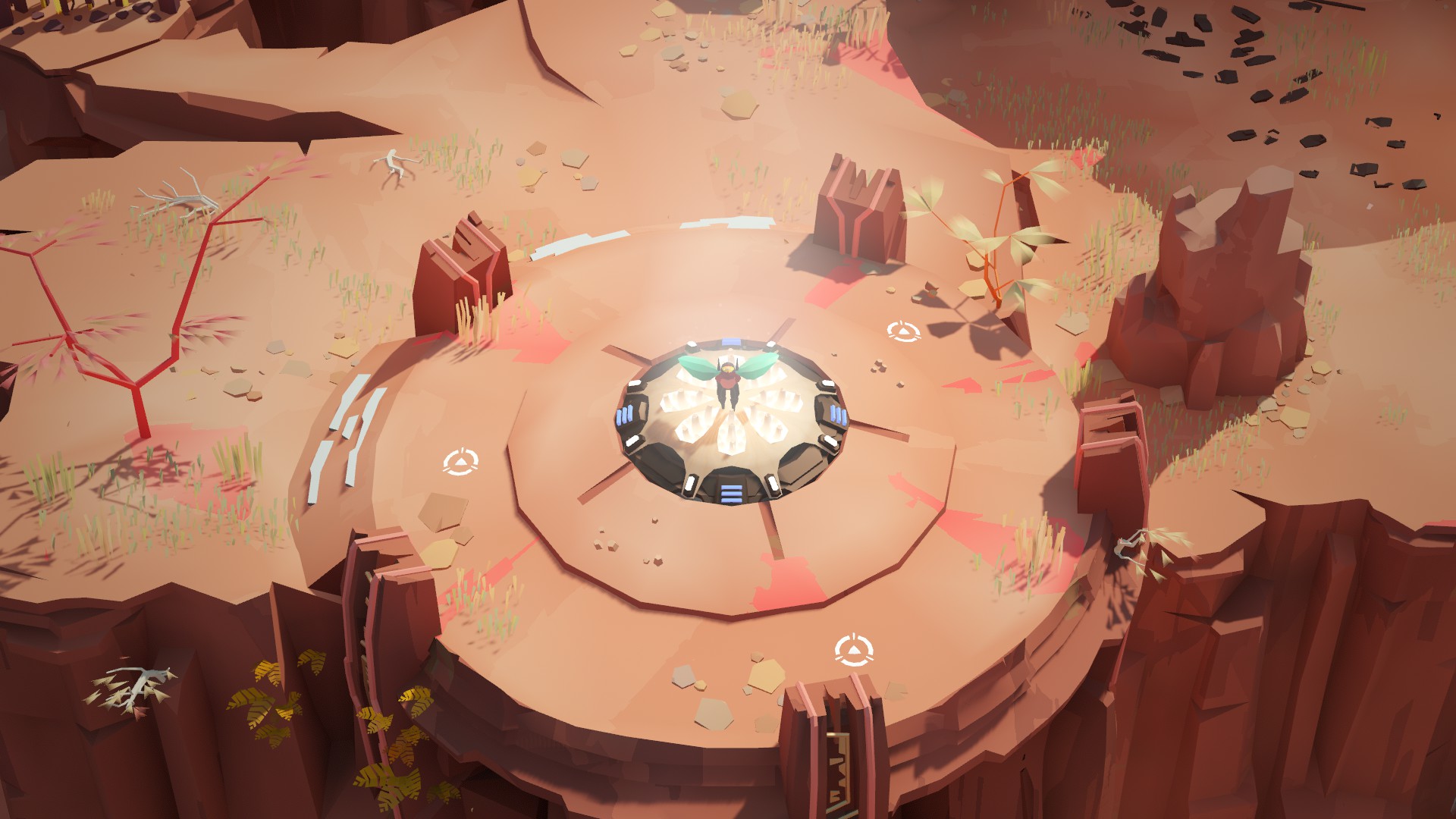
Release date: September 29, 2023
Platform(s): PC, PS4, PS5, Switch, Xbox One, Xbox Series X
Developer: Geometric Interactive
Publisher: Annapurna Interactive
But that's not all. The orbs are also important puzzle tools that need to be used in different ways. There are some puzzle-platforming staples: triggering switches, activating moving platforms, and scribbling down runic patterns, but each orb also has an ability that you'll need to utilize (the red orb can reveal invisible walkways, for example). Together with the world-hopping and the all-important rule that you can only carry one orb at a time, the result is orb juggling, Inception-style, world-within-a-world puzzle solving.
As a brief example, for one puzzle I had to cross a chasm by using an invisible bridge which would only reveal itself using the red orb's ability. So, I scuttle across the bridge – red orb on my back – but when I reached the other side there was a high platform that I needed to boost up to, an ability only granted by the green orb. So I run back across the bridge, place the red orb down, pick up the green orb and jump into the red orb's world. Then, I place the green orb down and jump back out, pick up the red orb, cross the bridge, jump back into the red orb, grab the green orb, jump back out, and then ascend to the platform with the green orb's powers. Phew.
It all evokes the same galaxy-brain mind-bending puzzles of Portal, Superliminal, Marquette, or the previously mentioned Viewfinder. But where other puzzle games might short-circuit your brain, Cocoon has a masterful knack for lulling you into a flowstate. Sure, you may need to get those neurons firing for one of two puzzles, but solving the majority is a more meditative experience. Working through each batch of puzzles felt completely seamless, even as new abilities and mechanics were introduced, and that's not surprising at all when you know that the brain behind it all is Limbo and Inside's lead gameplay designer Jeppe Carlsen.
Turn over a new leaf

Cocoon isn't a completely meditative experience though. There's no combat, but there are boss fights against the giant bug guardians nestled in the world of each orb. These encounters feel completely distinct from one another and are more majestic spectacles than challenging battles. They fall into the Zelda-style boss territory of being a mix of puzzler and top-down action.
The first fight is against what I can only describe as Robo Mothra, who fires bullet-hell-style projectiles. You need to find spaces in the mass of missiles while also getting the timing right to pick up an orb bomb and ram it into them. Every boss has its own pattern to learn, and although they might slightly raise your heart rate, they are by no means sweat-inducing (for perspective, I managed to defeat each one in two to three tries). It also gives you room to take in the majesty of these giant guardians, each one more impressive and imposing than the last. Their designs are a cool mix of insect and alien – each one feeling like the monstrous consequence of a bug taking a swim in a vat of radioactive goop. They're spectacular.
Weekly digests, tales from the communities you love, and more
"It all evokes the same galaxy-brain mind-bending puzzles of Portal, Superliminal, Marquette, and Viewfinder"
Both in the throws of colossal guardian encounters and in quiet moments of puzzle-solving, Cocoon always manages to subtly nudge you in the right direction. It's important I get across how intuitive it all feels because when first playing, you would think the game isn't communicating with you at all. There are no instructions or tutorials in this wordless world, no text pop-ups telling you to press 'A' to grab the orb. But in actuality, Cocoon is constantly communicating with you.
The game delicately guides you in subtle ways: smart environmental layouts, controller feedback (and I highly recommend you play with a controller over keyboard and mouse), a pitch-perfect puzzle difficulty gradient, and musical cues. I love these musical moments. There's little to no music in Cocoon, but often during puzzle sections, warm synths will rise out of the soundscape delicately confirming you're on the right track or dramatically punctuating a eureka moment. These delicate nudges all add to the game's sense of flow, small waves of non-verbal clues gently leading you along.
Creepy-crawly
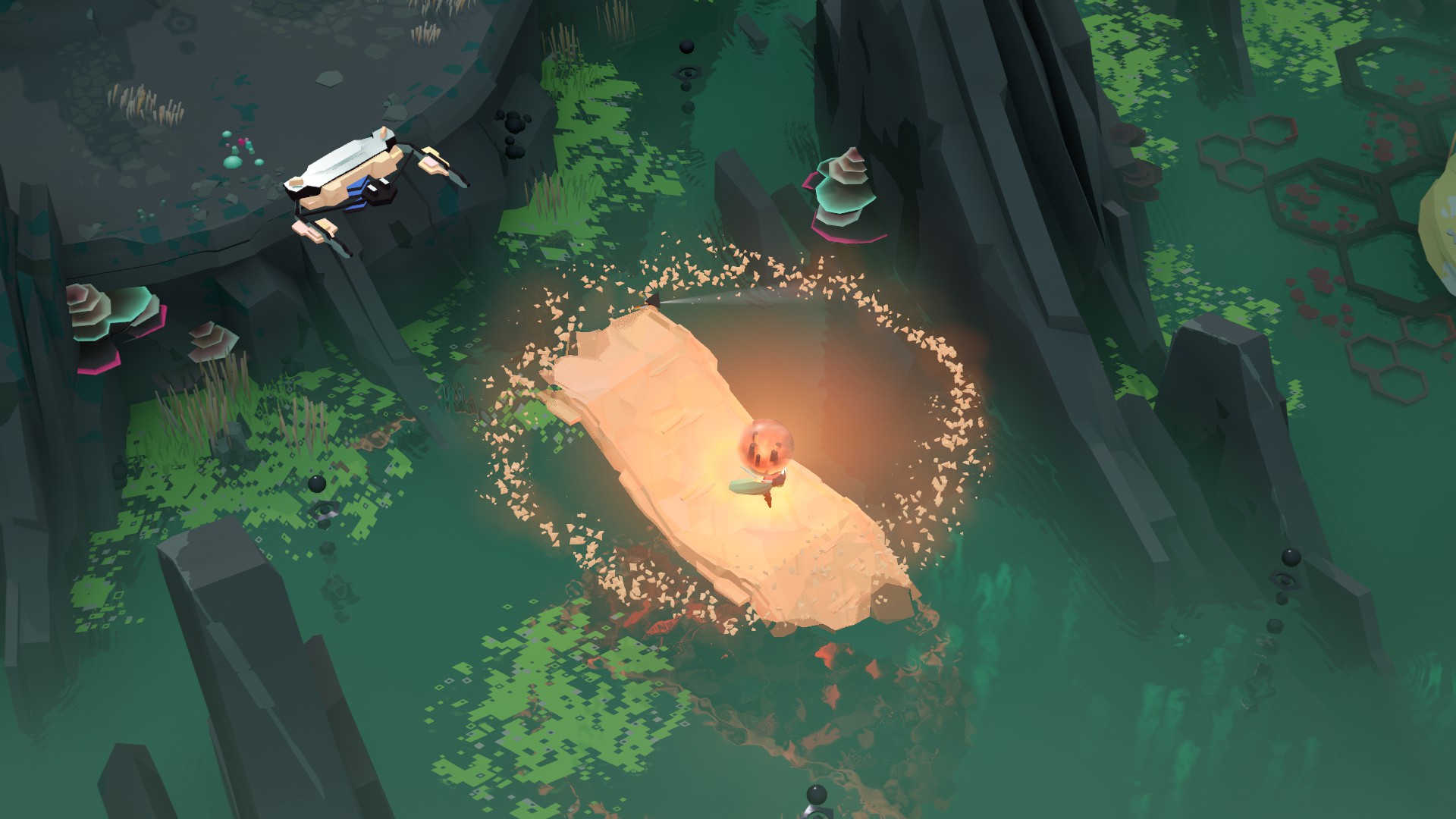
This non-verbal communication is present in Cocoon's story too. In comparison to other wordless games (games like Limbo and Inside, as well as the likes of Journey), Cocoon's story is even more elusive. There's definitely a story teased through environmental clues as your bug friend explores the remnants of this ancient world. As you journey through the caverns, deserts, swamplands, and ruins of this world the atmosphere is quietly mournful. There are multiple 'Moon Ancestors' to find in each orb's world – bug creatures that you can free from their stoney slumber – but how they play into the overall story I couldn't tell you as someone with only a single playthrough under her belt.
The ending confirms a few things (and there's also a secret ending to riddle out) but Cocoon's allure and atmosphere are more than enough to pull you through. I can't stress enough that the screenshots, as impressive as they are, do not capture the feel of this game. This alien world has a distinct presence about it – each area brimming with rich colors and textures. The lighting too is exceptional – the orb's luminescent glow is a comfort in the darkest of caverns.
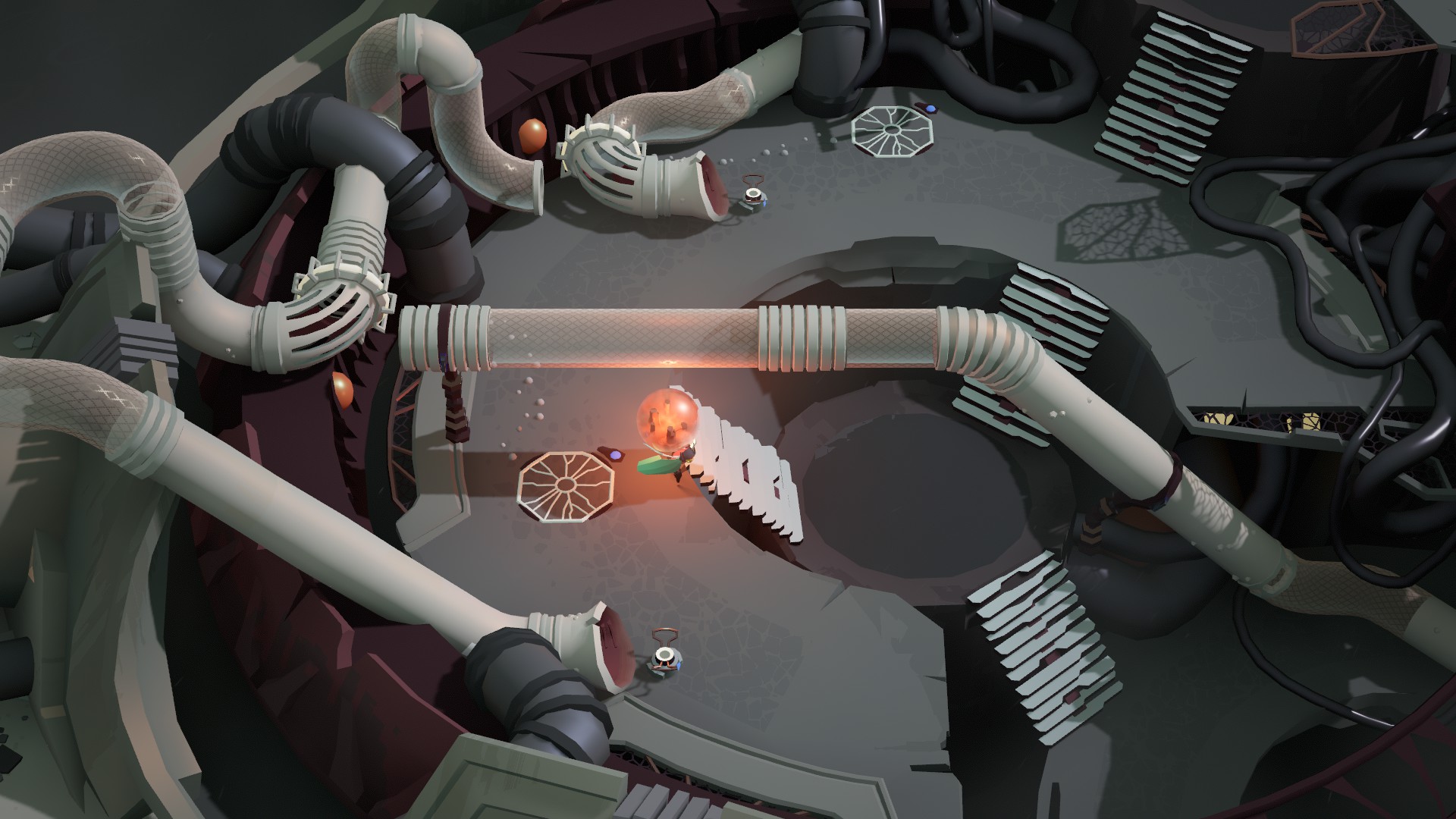

Cocoon isn't just one of the most memorable puzzle games of the year, but a contender for our best Xbox Game Pass games list too.
But a highlight for me is the soundscape. There's minimal music in Cocoon, so the environment ambience does a lot of the atmospheric heavy lifting, like the gentle thuds and groans of machinery, or the squelch of oozing tendrils and gloopy, squishy nodes. The opening of a doorway is practically a cinematic event – the low rumbling as it moves its hulking weight, the high buzz of something electric racing through wires, the mechanical whirring as parts of it fold away. The subtle clanks of raindrops as they hit the surface of a metallic platform gave my brain enough serotonin to last me a month. This ambience is wonderful. Even when it's totally silent it still feels like this game is breathing. You need to turn up your headphones for this one, it's honestly incredible.
There's so much to discover in Cocoon's five-hour run-time. The world design and atmosphere are engrossing, but its world-hopping puzzle mechanic is the real stand-out. The game's last string of puzzles are so truly bonkers that I couldn't even begin to explain them even if I wanted to.
Not to get too lofty, but you know how a musician's ears have been trained to pick up elements in music – I honestly felt like that during the last stretch of Cocoon's puzzles. I knew what the game wanted from me and I followed. It's a silent language that you learn to translate. Cocoon cuts out all the noise, and the result is one of the best puzzle adventure games of 2023. I've learned to pick up Cocoon's silent harmonies, and they're beautiful.
Cocoon was reviewed on PC, with code provided by the publisher.
More info
| Genre | Puzzle |

Rachel Watts is the former reviews editor for Rock Paper Shotgun, and in another life was a staff writer for Future publications like PC Gamer and Play magazine. She is now working as a freelance journalist, contributing features and reviews to GamesRadar+.
